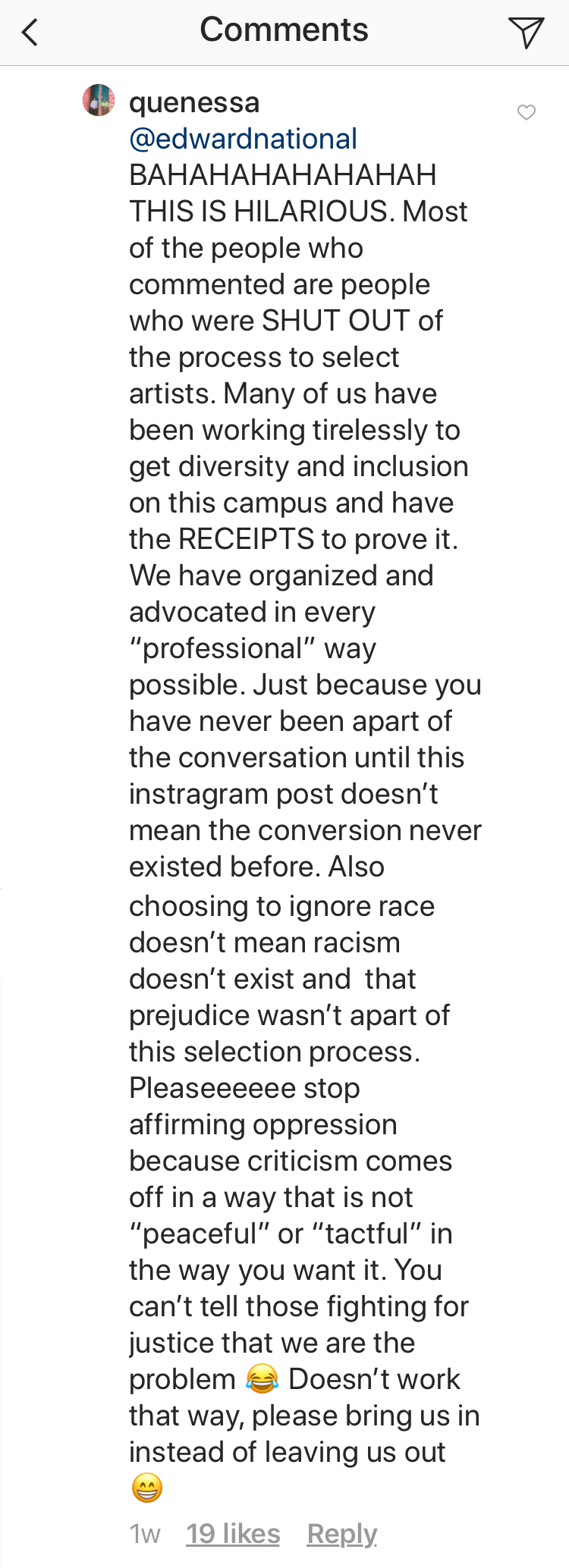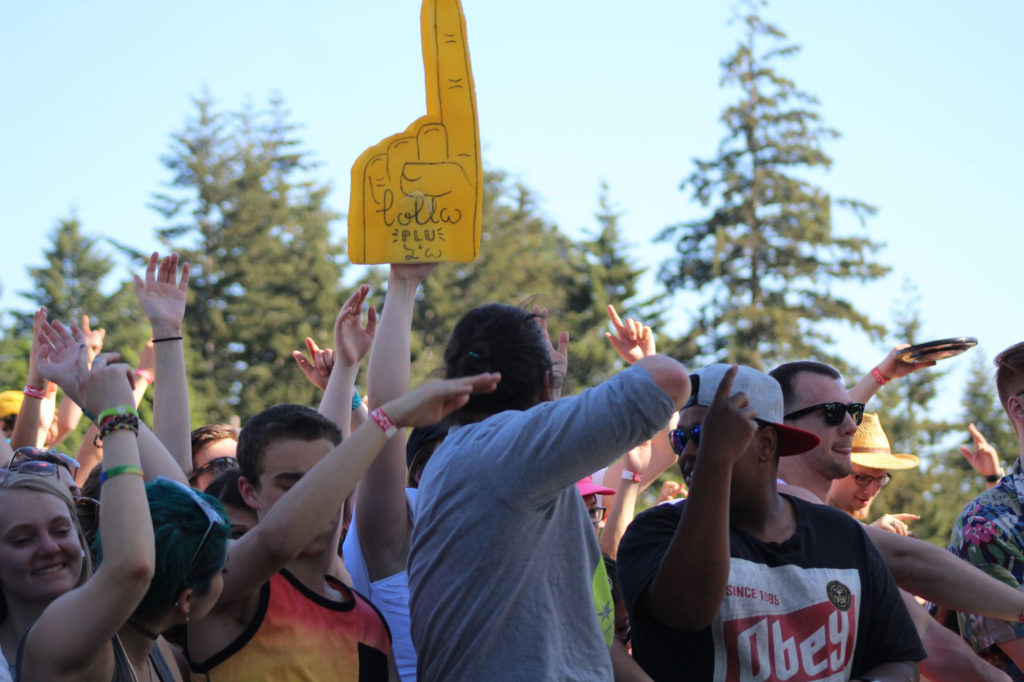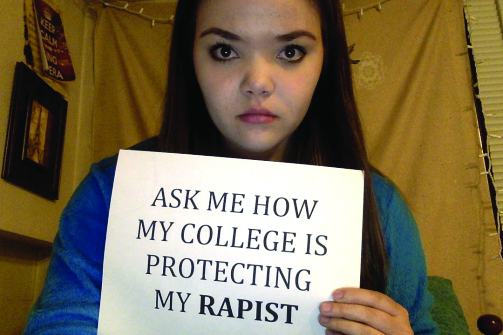MAST STAFF; mast@plu.edu
Editor’s Note: All comments from social media are printed as they were originally posted. The Mast reached out to Student Activities Board Director Josie Courtney and Assistant Director Natalie Mooney for interviews on the LollaPLUza lineup. Mooney declined to give individual comments. Courtney did not respond to requests for comment prior to the printing of this article.
Student Activities Board (SAB) released this year’s LollaPLUza (Lolla) artist lineup April 13 through a series of photo posts to the Lolla Instagram account. The photos showcased the lineup consisting of four cisgender white male acts, and elicited streams of comments from students noting the lack of racial and gender diversity in the artists.
Students who critiqued the Lolla lineup included seniors Marisol Espinosa, Quenessa Long and Marcos Giossi.
“It’s not like we don’t have a ton of talented poc around tacoma, let alone plu,” Espinosa wrote.
Giossi expressed similar concerns.
“We can’t get POC representation even in the musicians we bring to campus?” he wrote.
Long was active in the comments, especially the post announcing Seattle rapper Sam Lachow as the festival headliner.
“Many of us have been working tirelessly to get diversity and inclusion on this campus and have the RECEIPTS to prove it. We have organized and advocated in every ‘professional’ way possible,’” Long wrote. “Just because you have never been apart of the conversation until this Instragram post doesn’t mean the conversion never existed before. Also choosing to ignore race doesn’t mean racism doesn’t exist and that prejudice wasn’t apart of this selection process.”
While many students were critical of the lineup demographics, others questioned the legitimacy of the concerns. Senior Edward Na commented, chastising others for complaining without having actively participated in the process.
“Stop criticizing the fact it’s all white performers as it wasn’t the intention to offend anybody or exclude any type of artist […] I don’t understand why many of you feel offended or pissed about the events organization if you had no desire to help organize it???,” Na wrote. “Instead of complaining on instagram why don’t you give these people a professional feedback or maybe help organize it in the future. If they ask for feedback early in the year THEN GIVE IT TO THEM DONT JUST IGNORE IT THEN GET ALL OFFENDED THEY DIDNT FIND YOUR FAVORITE ARTIST OR ANYONE YOU THINK DESERVES TO BE THERE TO PERFORM.”
The Instagram comments sparked a conversation across campus about representation for students of color and the responsibility of student event organizers to ensure diversity in campus activities.
The LollaPLUza planning committee and SAB released a statement April 17 in response to the negative feedback. The statement was uploaded to the LollaPLUza Instagram page as a photo.
In the statement, SAB and the committee recognize the lack of diverse representation and apologize for the failure to meet the expectations of the Pacific Lutheran University community.
“We hear the angered and disappointed views of many students. The Student Activities Board would like to apologize for overlooking our performers’ identities and backgrounds and would like to assure the PLU community that we will be much more cognizant of representation in our artist selection in the future,” the letter read.
 The letter also noted that the process of choosing artists included soliciting student recommendations and accounting for budget constraints and availability of artists. All three of the performers, the letter said, were recommended by students.
The letter also noted that the process of choosing artists included soliciting student recommendations and accounting for budget constraints and availability of artists. All three of the performers, the letter said, were recommended by students.
PLU staff in the office of Student Engagement followed up this letter with a campus-wide email April 20. Signed by six staff members, the email also apologizes on behalf of Student Engagement for not taking more care in the ensuring diversity in Lolla planning process.
“We apologize to PLU’s students and the campus community for failing to engage in a genuinely culturally-responsive planning and selection process for LollaPLUza, for overlooking the homogenous identities of the featured artists, and for perpetuating exclusionary practices and policies that unjustly dishonor and hurt our campus community,” the email read.
The email also noted the lack of training to equip SAB students with “knowledge, skills, or relationships—to navigate the cultural complexities.” Inclusive hiring practices, social justice training and culturally-responsive initiatives are noted as a priority for Student Engagement in their future work with SAB and other student organizations.
THE ORGANIZERS
With all positions filled, SAB employs a Director, Public Relations Assistant Director and five programmers. Junior Josie Courtney currently serves as SAB Director and Junior Natalie Mooney works as Assistant Director. Courtney, Mooney and three programmers currently sit on the LollaPLUza planning committee.
Graduate Intern in the Office for Student Engagement Maileny Guillén began serving as SAB adviser in the Fall of 2017. Guillén said that, to her knowledge, SAB employees are predominantly white.
Guillén was hired to advise SAB, Associated Students of PLU and Clubs & Organizations shortly after former Director for Student Engagement, Ian Jamieson, left PLU to pursue a position elsewhere.
Guillén works part-time as an adviser for Student Engagement in addition to attending graduate school full time, working another job and engaging in the job search process. Her work at PLU mostly entails consistent one-on-one meetings with SAB Director and Assistant Director, attending general staff meetings and being generally available throughout the week to offer guidance.
We realize that Lolla is happening in a context of what’s been happening at PLU and representative of other choices that have been made in other programs.
-Jes Takla, Director of Residential Programs
In terms of LollaPLUza, Guillén said her role as adviser for SAB entailed answering questions about specific aspects like artist contracts and counselling students in making their own decisions regarding the event.
“The role of the adviser is to allow the students in the organization to run it and make the decisions, and for me to advise [and] ask questions to guide them in their decision making. Not make the decisions for them,” Guillén said. “It’s giving them the autonomy and agency to do what they think is best for the organization.”
Vice President for Student Life Joanna Royce-Davis said the shift in the adviser position contributed to some instability in staff leadership for SAB and LollaPLUza planning. Other staff turnover in the office for Student Engagement, Royce-Davis said, also contributed to inconsistency in staff resources for SAB during the process.
“There’s been some concern about continuity of presence for students, and engagement, and contribution to students via advising that helps both with training and discernment about decision making,” Royce-Davis said.
THE PROCESS
The total LollaPLUza budget originally included $25,000, but was cut to $22,000 to to cover excess costs related to the Homecoming Carnival in the fall. SAB spent $6,200 contracting artists to perform.
Sam Lachow was confirmed as the headliner in February under a contracted $6,000 performance fee. SAB originally lined up EDM performer Ruely Tunes but lost the act because PLU couldn’t provide the proper mixing equipment.

Student hold ups LollaPLUza foam finger during the festival in 2016.
Guillén said hip-hop singer Raymond McMahon was contracted last minute for $200 as a replacement. The rap duo R3AZONS also suddenly replaced another dropped act, free of charge.
To search for local Pacific Northwest performers, SAB consulted an agent who provided suggestions for artists based on the allotted budget. SAB programmers then researched artists, listening to their music and looking at their social media success.
Guillén said students on the planning committee searched for artists that aligned with the type of music the committee decided to showcase.
“They determined the musical style they wanted at Lolla and determined that a slower style of music was not conducive to the environment they were trying to create,” Guillén said. “For example, one of our original artists, Ruely Tunes, was an EDM DJ. So, music that would really get people excited and engaged with Lolla and wanting to come.”
To garner student input, SAB invited students to give suggestions during a tabeling session in the Anderson University Center. Guillén said SAB also posted a poll on Twitter and an Instagram photo prompting students to give suggestions on artists to include in the festival and other general feedback.
A photo on Instagram of the LollaPLUza logo features a caption inviting students to comment on what Lolla activities they are excited to participate in. The poll posted to the LollaPLUza Twitter account asks what aspects of the festival—including music, food, games and free stuff—students are excited for. No posts to either account explicitly asks students for suggestions on LollaPLUza artists.
Guillén noted that there was no conversation about the diversity of artists among SAB committee members during the decision process. She said a lack of historical knowledge on SAB processes and the last-minute artist additions contributed to the lack of attention.
“A lot of it was figure it out on-the-go and what we thought would work. After the lineup was advertised we realized [it] was an oversight on our part and we didn’t think about the diversity and makeup of the artists that were at Lolla,” Guillén said.
Guillén also said SAB reached out to Lute Air Student Radio (LASR) earlier in spring semester to get feedback on artist selection. LASR, she said, did not respond to this invitation to give feedback but reached out to SAB concerning staffing a booth at the festival.
It shouldn’t take a suggestion box for poc/women to be respected and hired in the first place.
LASR General Manager Leah Mellmer said the main LASR email account does not have records of emails sent by SAB concerning artists. The only email LASR received, Mellmer said, regarded reserving a booth.
Music Director Ian Lindhartsen said he reached out to SAB to inquire about ways to get involved with the LollaPLUza planning process, but was not incorporated.
“The news that was brought back to our leadership meeting was that the organizers of Lolla did not want to include LASR in the decision making process,” Mellmer said. “We assumed they thought it would be more difficult to coordinate all the opinions if more people were involved.”
THE RESPONSE
The negative social media comments first came to the attention of SAB shortly after their posts announcing the artists April 13. Guillén said she and other staff members within the office for Student Engagement became aware of the backlash Monday April 16.
Guillén said her first reaction was a realization of error.
“My initial thought was, ‘We messed up and the students are completely right. We did not think about the diversity of the artists at Lolla, and this was our mess. Now, we need to fix it,’” Guillén said.
Director of Residential Programs Jes Takla said she appreciated students highlighting the diversity issue.
Royce-Davis said she was primarily concerned with the impact of the decision on students of color.
“I also was immediately concerned about cumulative impact, particularly for students of color and what that would mean for experience at a time that is particularly stressful in the semester,” Royce-Davis said.
After becoming aware of the criticism, Mooney sought support from Student Engagement to write the letter later posted to the LollaPLUza Instagram page. Guillén said Student Engagement also recognized the need to release a separate email statement to the PLU community taking ownership alongside SAB. Takla noted that a variety staff members from the Diversity Center, Student Engagement and Student Life were consulted on the content and wording of the email.
In the email, Student Engagement apologizes specifically for contributing to the “salt in wound” experience of students who have had previous exclusionary interactions with PLU and Student Engagement.
“We realize that Lolla is happening in a context of what’s been happening at PLU and representative of other choices that have been made in other programs,” Takla said. “Recognizing the cumulative impact—both the idea of wounding coming from students being upset about this particular event, but a re-wounding in the sense that we’re trying to recognize that there is a cumulative impact as well.”
Royce-Davis said SAB and Student Engagement staff briefly considered cancelling this year’s LollaPLUza in response to the criticism.
Several students in the Instagram comments section challenged the idea that their lack of input in the process justified the lack of racial and gender diversity in the Lolla lineup.
“It shouldn’t take a suggestion box for poc/women to be respected and hired in the first place,” senior Rizelle Rosales wrote.
Guillén agreed, saying that the responsibility lies not only with students but PLU staff and student organizations as well.
“It’s also owning and recognizing that people of color have been left out of the conversation and the equation since forever,” Guillén said. “Recognizing that we have to be more intentional when we’re having these conversations to make sure that we’re being inclusive to all sorts of people.”
Royce-Davis highlighted this incident as an example of the pervasiveness of implicit bias.
“[It’s a] recognition of how real implicit bias is in all decision making. […] One of the things we know about implicit bias is that it requires a kind of slowing down to recognize,” Royce-Davis said. “Often we’re on compressed timelines around campus events that it might require pre-thinking who the teams are, how the timelines are implemented and at what point is feedback incorporated.”



















